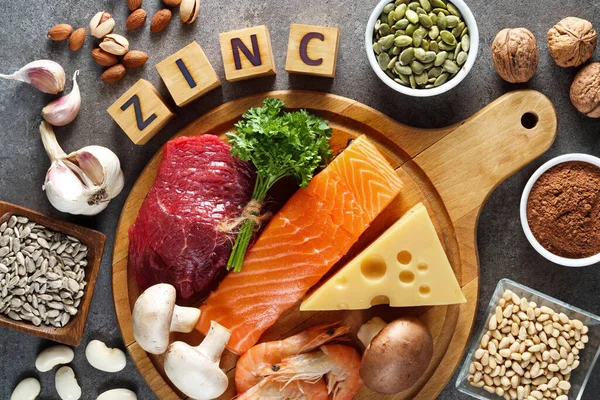Zinc health benefits are amazing and awesome! zinc is an essential mineral that plays a vital role in many aspects of human health. It is the second most abundant trace metal in the body after iron, and it is found in every cell. Zinc is involved in over 300 different enzymes, which are responsible for a wide range of functions, including:

- Cell growth and division
- Immune function
- Wound healing
- DNA synthesis
- Protein production
- Sense of taste and smell
- Reproduction
- Growth and development
- Bone health
- Vitamin A metabolism
- Hormone production
- Blood sugar regulation
Zinc is also important for the development and function of the immune system. It helps to produce and activate white blood cells, which are essential for fighting off infection. Zinc deficiency can impair the immune system and make people more susceptible to illness.
Zinc is also involved in wound healing. It helps to produce new cells and tissues, and it also helps to protect the wound from infection. Zinc deficiency can delay wound healing and increase the risk of infection.
Zinc is essential for normal growth and development, especially in children and adolescents. It is also important for pregnant and lactating women. Zinc deficiency in children can lead to growth stunting, developmental delays, and impaired immune function.
Here are some of the specific health benefits of zinc:
- Boosts immunity: Zinc is essential for the development and function of the immune system. It helps to produce and activate white blood cells, which are responsible for fighting off infection.
- Promotes wound healing: Zinc plays a role in the production of collagen, which is a protein that is essential for wound healing. Zinc also helps to protect the wound from infection.
- Supports growth and development: Zinc is essential for normal growth and development in children and adolescents. It is also important for pregnant and lactating women.
- Improves reproductive health: Zinc is important for the production of sperm and testosterone in men. It is also important for the production of eggs and progesterone in women.
- Protects bone health: Zinc is important for the formation and maintenance of bones. Zinc deficiency can increase the risk of osteoporosis and other bone diseases.
- Improves blood sugar control: Zinc can help to improve blood sugar control in people with diabetes.
- Reduces the risk of age-related macular degeneration: Zinc is important for the health of the retina, and it may help to reduce the risk of age-related macular degeneration, a leading cause of blindness in older adults.
Types
There are many different types of zinc available, but some of the most common include:
- Zinc sulfate: This is the least expensive form of zinc, but it is also the least easily absorbed. Zinc sulfate may also cause stomach upset in some people.
- Zinc gluconate: This is a more easily absorbed form of zinc that is often used in cold remedies and other over-the-counter products.
- Zinc acetate: This is another easily absorbed form of zinc that is often used in cold lozenges.
- Zinc picolinate: This form of zinc is bound to picolinic acid, which is thought to improve its absorption.
- Zinc citrate: This form of zinc is bound to citric acid, which is also thought to improve its absorption.
Other types of zinc include zinc orotate, zinc glycerate, and zinc monomethionine.
The best type of zinc for you will depend on your individual needs and preferences. If you are unsure which type of zinc to choose, talk to your doctor or a registered dietitian.
It is important to note that zinc supplements can interact with other medications, so it is always best to talk to your doctor before taking them.
Food Sources of Zinc

The best food sources of zinc are animal foods, such as:
- Meat: Beef, lamb, pork, and chicken are all good sources of zinc.
- Poultry: Chicken and turkey are both good sources of zinc.
- Seafood: Oysters, crab, shrimp, lobster, and other fish are all good sources of zinc.
- Shellfish: Oysters are the best source of zinc, followed by crab, lobster, and shrimp.
- Eggs: Eggs are a good source of zinc, and they are also a good source of protein and other nutrients.
- Dairy products: Dairy products such as milk, cheese, and yogurt are good sources of zinc.
Plant-based foods are also good sources of zinc, but they contain a compound called phytate, which can inhibit zinc absorption. To improve zinc absorption from plant-based foods, soak them overnight in water and cook them thoroughly before eating.
Some good plant-based sources of zinc include:
- Beans: Lentils, chickpeas, and black beans are all good sources of zinc.
- Nuts: Almonds, cashews, and peanuts are all good sources of zinc.
- Seeds: Pumpkin seeds, sunflower seeds, and sesame seeds are all good sources of zinc.
- Whole grains: Whole grains such as oats, quinoa, and brown rice are all good sources of zinc.
Fortified foods, such as cereals and breakfast bars, are also good sources of zinc.
It is important to note that zinc needs vary depending on age, gender, and other factors. The recommended daily intake of zinc for adults is 8 milligrams for men and 11 milligrams for women. Pregnant women and women who are breastfeeding need more zinc, 12 milligrams and 13 milligrams per day, respectively.
Implication of Zinc Deficiency
Zinc deficiency can lead to a variety of health problems, including:
- Growth stunting in children
- Developmental delays
- Impaired immune function
- Increased risk of infection
- Delayed wound healing
- Skin problems
- Hair loss
- Diarrhea
- Loss of appetite
- Taste disturbances
- Smell disturbances
- Male infertility
Zinc Side Effects
Zinc is generally safe for most people when taken in recommended doses. However, it is important to note that zinc can cause side effects, especially when taken in high doses.
Read Related Also: New Study Says – Morning Workouts Help You Lose More Belly Fat
The most common side effects of zinc supplements include:
- Stomach upset
- Nausea
- Vomiting
- Diarrhea
- Headache
Other potential side effects of zinc supplements include:
- Reduced copper absorption
- Reduced immune function
- Kidney stones
- Pancreatitis
- Anemia
It is important to talk to your doctor before taking zinc supplements, especially if you have any underlying health conditions or are taking other medications.
Zinc supplements can also interact with certain medications, such as antibiotics, quinolones, and thyroid medications. If you are taking any medications, be sure to talk to your doctor before taking zinc supplements.
If you experience any side effects after taking zinc supplements, stop taking them and talk to your doctor.
Here are some tips for minimizing the risk of side effects from zinc supplements:
- Start with a low dose and increase gradually as needed.
- Take zinc supplements with food to reduce stomach upset.
- Avoid taking zinc supplements at the same time as other medications, especially antibiotics, quinolones, and thyroid medications.
- Talk to your doctor before taking zinc supplements if you have any underlying health conditions.
FAQs
Q: How much zinc do I need each day?
The recommended daily intake of zinc for adults is 8 milligrams for men and 11 milligrams for women. Pregnant women and women who are breastfeeding need more zinc, 12 milligrams and 13 milligrams per day, respectively.
Q: What are the best sources of zinc?
The best sources of zinc are animal foods, such as meat, poultry, seafood, and shellfish. Plant-based foods are also good sources of zinc, but they contain a compound called phytate, which can inhibit zinc absorption. To improve zinc absorption from plant-based foods, soak them overnight in water and cook them thoroughly before eating.
Q: Can I take too much zinc?
Yes, it is possible to take too much zinc. Taking high doses of zinc can cause side effects such as stomach upset, nausea, vomiting, diarrhea, and headache. It can also reduce copper absorption and immune function.
Q: Who should not take zinc supplements?
People with certain health conditions, such as kidney disease and Wilson’s disease, should not take zinc supplements without talking to their doctor.
Q: Can I take zinc supplements while pregnant or breastfeeding?
Yes, you can take zinc supplements while pregnant or breastfeeding, but it is important to talk to your doctor first. The recommended daily intake of zinc for pregnant women is 12 milligrams and for breastfeeding women is 13 milligrams.







1 comment
Comments are closed.